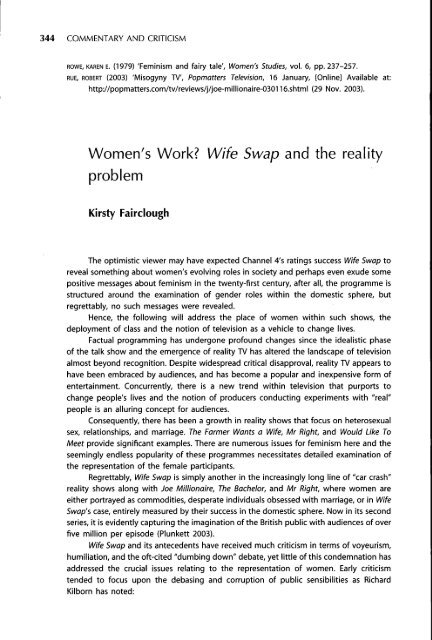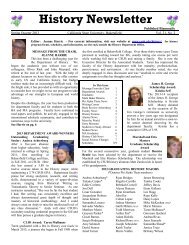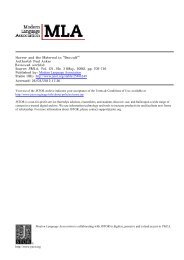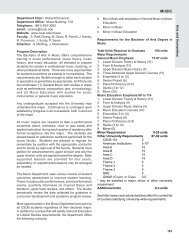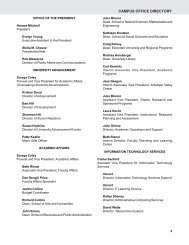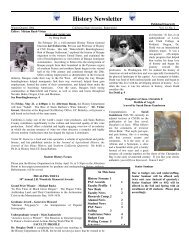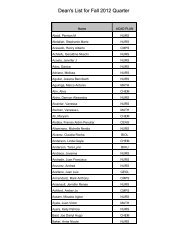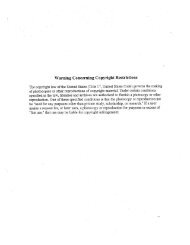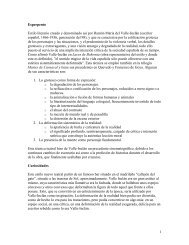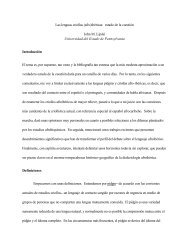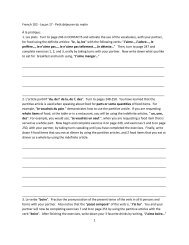Article 1: "Women's Work: Wife Swap and the Reality Problem."
Article 1: "Women's Work: Wife Swap and the Reality Problem."
Article 1: "Women's Work: Wife Swap and the Reality Problem."
Create successful ePaper yourself
Turn your PDF publications into a flip-book with our unique Google optimized e-Paper software.
344 COMMENTARY AND CRITICISM<br />
ROWE, KAREN E, (1979) 'Feminism <strong>and</strong> fairy tale'. <strong>Women's</strong> Studies, vol, 6, pp. 237-257,<br />
RUE, ROBERT (2003) 'Misogyny TV', Popmatters Television, 16 January, [Online] Available at:<br />
http://popmatters,com/tv/reviews/j/joe-millionaire-030116.shtml (29 Nov, 2003).<br />
<strong>Women's</strong> <strong>Work</strong>? <strong>Wife</strong> <strong>Swap</strong> <strong>and</strong> <strong>the</strong> reality<br />
problem<br />
Kirsty Fairclough<br />
The optimistic viewer may have expected Channel 4's ratings success <strong>Wife</strong> <strong>Swap</strong> to<br />
reveal something about women's evolving roles in society <strong>and</strong> perhaps even exude some<br />
positive messages about feminism in <strong>the</strong> twenty-first century, after all, <strong>the</strong> programme is<br />
structured around <strong>the</strong> examination of gender roles within <strong>the</strong> domestic sphere, but<br />
regrettably, no such messages were revealed.<br />
Hence, <strong>the</strong> following will address <strong>the</strong> place of women within such shows, <strong>the</strong><br />
deployment of class <strong>and</strong> <strong>the</strong> notion of television as a vehicle to change lives.<br />
Factual programming has undergone profound changes since <strong>the</strong> idealistic phase<br />
of <strong>the</strong> talk show <strong>and</strong> <strong>the</strong> emergence of reality TV has altered <strong>the</strong> l<strong>and</strong>scape of television<br />
almost beyond recognition. Despite widespread critical disapproval, reality TV appears to<br />
have been embraced by audiences, <strong>and</strong> has become a popular <strong>and</strong> inexpensive form of<br />
entertainment. Concurrently, <strong>the</strong>re is a new trend within television that purports to<br />
change people's lives <strong>and</strong> <strong>the</strong> notion of producers conducting experiments with "real"<br />
people is an alluring concept for audiences.<br />
Consequently, <strong>the</strong>re has been a growth in reality shows that focus on heterosexual<br />
sex, relationships, <strong>and</strong> marriage. The Farmer Wants a <strong>Wife</strong>, Mr Right, <strong>and</strong> Would Like To<br />
Meet provide significant examples. There are numerous issues for feminism here <strong>and</strong> <strong>the</strong><br />
seemingly endless popularity of <strong>the</strong>se programmes necessitates detailed examination of<br />
<strong>the</strong> representation of <strong>the</strong> female participants.<br />
Regrettably, <strong>Wife</strong> <strong>Swap</strong> is simply ano<strong>the</strong>r in <strong>the</strong> increasingly long line of "car crash"<br />
reality shows along with Joe Millionaire, The Bachelor, <strong>and</strong> Mr Right, where women are<br />
ei<strong>the</strong>r portrayed as commodities, desperate individuals obsessed with marriage, or in <strong>Wife</strong><br />
<strong>Swap</strong>'s case, entirely measured by <strong>the</strong>ir success in <strong>the</strong> domestic sphere. Now in its second<br />
series, it is evidently capturing <strong>the</strong> imagination of<strong>the</strong> British public with audiences of over<br />
five million per episode (Plunkett 2003).<br />
<strong>Wife</strong> <strong>Swap</strong> <strong>and</strong> its antecedents have received much criticism in terms of voyeurism,<br />
humiliation, <strong>and</strong> <strong>the</strong> oft-cited "dumbing down" debate, yet little of this condemnation has<br />
addressed <strong>the</strong> crucial issues relating to <strong>the</strong> representation of women. Early criticism<br />
tended to focus upon <strong>the</strong> debasing <strong>and</strong> corruption of public sensibilities as Richard<br />
Kilborn has noted:
COMMENTARY AND CRITICISM 345<br />
The audience can sometimes be manoeuvred into eavesdropping positions <strong>and</strong> allowed<br />
to witness events in ways which p<strong>and</strong>er to less desirable traits in human nature. There<br />
is in o<strong>the</strong>r words, a quite underst<strong>and</strong>able fear that reality programming if taken to <strong>the</strong><br />
extreme, embodies <strong>the</strong> worst kind of common denominator TV. (Richard Kilborn 1994,<br />
• p. 427)<br />
This is also evident more recently in <strong>the</strong> broadsheet press:<br />
These "humiliation shows" have re-ignited <strong>the</strong> debate over st<strong>and</strong>ards in television.<br />
Ministers, psychologists <strong>and</strong> even some programme-makers have condemned <strong>the</strong>m as<br />
"sick-making". Producers <strong>and</strong> directors admit <strong>the</strong> shows are sadistic but say celebrities<br />
<strong>and</strong> members of <strong>the</strong> public are "queuing up" to take part. (John Arlidge 2003)<br />
Such criticism is part of a long tradition of cultural commentators bemoaning <strong>the</strong><br />
effects of television <strong>and</strong> expressing a parental concern for <strong>the</strong> audience. Conversely, in<br />
<strong>the</strong> 1990s, feminist critics such as Jane Shattuc (1997) championed popular television <strong>and</strong><br />
talk shows in particular as a positive forum for <strong>the</strong> examination of women's issues.<br />
Unfortunately, after <strong>the</strong> quantifiable progress that has been made in terms of <strong>the</strong><br />
representation of women within visual media, a programme such as <strong>Wife</strong> <strong>Swap</strong> is<br />
intrinsically negative <strong>and</strong> even threatens to undo this progress due to its harking back to<br />
an outdated <strong>and</strong> conservative representation of wives <strong>and</strong> mo<strong>the</strong>rs.<br />
<strong>Wife</strong> <strong>Swap</strong>'s premise is a vicious one, staged so that <strong>the</strong> women are positioned<br />
against each o<strong>the</strong>r from <strong>the</strong> outset, <strong>and</strong> naturally <strong>the</strong> situation is exacerbated to make<br />
"good TV." The programme makers have clearly designed a format to create conflict but<br />
surreptitiously hide behind a seemingly observational mode. Predictably, <strong>the</strong> couples are<br />
chosen in terms of <strong>the</strong>ir social status <strong>and</strong> class issues are <strong>the</strong> unspoken basis for selection.<br />
The female participants are often represented as pushy, domineering or stupid. Most<br />
episodes conclude with <strong>the</strong> husb<strong>and</strong>s looking on innocently as <strong>the</strong>ir wives attack each<br />
o<strong>the</strong>r's lifestyles <strong>and</strong> furiously defend <strong>the</strong>ir own. For instance, series one saw Kate, a<br />
housewife <strong>and</strong> mo<strong>the</strong>r of six, sneer at Tracey, her career-focused counterpart "for a<br />
woman to fail as a housewife is ridiculous."<br />
Compelling as this may be. <strong>Wife</strong> <strong>Swap</strong> achieves nothing except to fur<strong>the</strong>r emphasise<br />
<strong>the</strong> fact that women should be natural homemakers by virtue of <strong>the</strong>ir gender <strong>and</strong><br />
confirms <strong>the</strong> notion that <strong>the</strong>re is little positive about <strong>the</strong>se types of outmoded gender<br />
stereotypes.<br />
The questions that <strong>Wife</strong> <strong>Swap</strong> calls forth are many. Not least, are <strong>the</strong> participants<br />
really representative of <strong>the</strong> way most couples still operate, with <strong>the</strong> men portrayed as<br />
doing little of <strong>the</strong> domestic work <strong>and</strong> often emerging from <strong>the</strong> programme as heroes,<br />
whilst <strong>the</strong> women appear as ei<strong>the</strong>r impossibly controlling or exploited doormats?<br />
The premise of <strong>the</strong> series is based exclusively around <strong>the</strong> women's place in <strong>the</strong><br />
home <strong>and</strong> any reference to careers <strong>and</strong> <strong>the</strong> workplace is inconsistent <strong>and</strong> alarmingly<br />
limited. Indeed, <strong>the</strong> programme makers have an incoherent attitude towards <strong>the</strong> women<br />
by representing only half of <strong>the</strong>ir lives. Allusion to <strong>the</strong> women's jobs is often portrayed<br />
as troublesome, an interference in <strong>the</strong> lives of those who have to live with <strong>the</strong>m. In <strong>the</strong><br />
first series, one woman's career was unashamedly used as an attack on working mo<strong>the</strong>rs<br />
<strong>and</strong> appeared to confirm <strong>the</strong> belief that women simply cannot have it all. This episode<br />
was particularly troubling <strong>and</strong> highlighted fur<strong>the</strong>r <strong>the</strong> continued struggle that women still
346 COMMENTARY AND CRITICISM<br />
have to negotiate at home, at work, <strong>and</strong> within society at large. It appears that according<br />
to television producers, <strong>the</strong> division of household chores, personal habits, taste, <strong>and</strong><br />
parenting are <strong>the</strong> new battlefields in which women are contesting <strong>the</strong>ir homes, marriages,<br />
<strong>and</strong> self-esteem.<br />
There is occasionally, a weak attempt at highlighting <strong>the</strong> oppression of women by<br />
<strong>the</strong>ir domineering husb<strong>and</strong>s. In series one, Michelle swaps with Carole, whose husb<strong>and</strong><br />
Peter appears as an enlightened "new man." Michelle is married to Barry, a difficult,<br />
insecure, <strong>and</strong> domineering individual. Humiliation is key, <strong>and</strong> admittedly, Michelle's<br />
husb<strong>and</strong> Barry is amusingly officious, but <strong>the</strong> overt humiliation of Michelle's decision to<br />
live with this man smacks of middle-class snobbery. This humiliation is concealed in a veil<br />
of self-discovery for <strong>the</strong> participant <strong>and</strong> presumes that <strong>the</strong> audience will learn something<br />
from watching <strong>the</strong> misery <strong>and</strong> embarrassment of o<strong>the</strong>rs.<br />
Yet <strong>Wife</strong> <strong>Swap</strong> has become something of a cultural phenomenon which has<br />
galvanised <strong>the</strong> press, not due to its negative portrayal of wives <strong>and</strong> mo<strong>the</strong>rs, but because<br />
of <strong>the</strong> overt class warfare on display. Indeed, class appears to be an increasingly popular<br />
<strong>the</strong>me within reality TV. Recent programmes including Dinner Party Inspectors, Holiday<br />
Showdown, <strong>and</strong> Take My Mo<strong>the</strong>r-in-Law use class as <strong>the</strong> underpinning force for conflict.<br />
The premise of <strong>the</strong>se shows is an arrogant one which invites <strong>the</strong> viewer to delight in<br />
sneering at <strong>the</strong> working classes in a way that hasn't been acceptable since <strong>the</strong> 1950s.<br />
This class conflict appears to be key to <strong>the</strong> success of <strong>Wife</strong> Svi/ap. What becomes<br />
clear is that <strong>the</strong> lower middle classes are positioned as educating <strong>the</strong> earthy, raucous<br />
working classes about social etiquette <strong>and</strong> <strong>the</strong> working classes often exhibit more<br />
emotion <strong>and</strong> warmth for <strong>the</strong>ir children than <strong>the</strong>ir aspirational counterparts. Or as<br />
Guardian journalist Zoe Williams asserts, "It's an old-school morality tale that starts off<br />
with how frightful <strong>the</strong> working classes are, <strong>the</strong>n winds us round to <strong>the</strong> inevitable<br />
conclusion that, hey, <strong>the</strong>y may be poor, but <strong>the</strong>y're good <strong>and</strong> <strong>the</strong>y're happy" (Zoe<br />
Williams 2003).<br />
The range of class fractions on display is palpable, <strong>the</strong> lower middle-class women<br />
are often portrayed as seeking to distance <strong>the</strong>mselves from <strong>the</strong> working-class women <strong>and</strong><br />
this is of course where conflict is fashioned <strong>and</strong> played out. Indeed, <strong>the</strong> representation of<br />
wives <strong>and</strong> mo<strong>the</strong>rs within this class war is repeatedly outdated <strong>and</strong> unnecessary.<br />
Despite <strong>the</strong> misguided naivety that <strong>Wife</strong> <strong>Swap</strong> may be more than cheap entertainment,<br />
it ultimately reveals little about changing social attitudes towards men <strong>and</strong><br />
women's roles in <strong>the</strong> domestic sphere, is decidedly unconcerned with how gender is<br />
negotiated, contested, <strong>and</strong> reconfigured across media forms, <strong>and</strong> simply reinforces <strong>the</strong><br />
outdated stereotype that a woman's place really should be in <strong>the</strong> home. One can only<br />
hope that <strong>the</strong> overall message arising from <strong>Wife</strong> <strong>Swap</strong> is that feminism is not only relevant<br />
in contemporary society, but absolutely essential.<br />
REFERENCES<br />
ARUDGE, JOHN (2003) 'Cruelty TV', The Observer, 18 May, [Online] Available at: http://<br />
observer,guardian.co.uk/focus/story/0,6903,958246,00,html<br />
THE BACHELOR (television series) ABC,<br />
DINNER PARTY INSPECTORS (television Series) BBC2.<br />
THE FARMER WANTS A WIFE (television Series) ITV.<br />
HOLIDAY SHOWDOWN (television series) ITV.<br />
JOE MILLIONAIRE (television series) Fox.
COMMENTARY AND CRITICISM 347<br />
KILBORN, RICHARD (1994) 'How real can you get: recent developments in reality television',<br />
European Journai of Communication, vol. 9, no. 4, p, 427.<br />
MR R/GHT (television series) ITV.<br />
PLUNKETT, JOHN (2003) The Guardian, 29 January.<br />
SHATTUC, JANE (1997) The Talking Cure: Television Talk Shows <strong>and</strong> Women, Routledge, London.<br />
TAKE MY MOTHER-IN-LAW {te\e\/\s\or\ series) ITV.<br />
WIFE SWAP (television series) Channel 4,<br />
WILLIAMS, ZOE (2003) 'Bride <strong>and</strong> prejudice'. The Guardian, ^ 1 November, [Online] Available at:<br />
http://guardian,co,uk/comment/story/0,,1082297,00.html<br />
WOULD LIKE TO MEET (television series) BBC 2,<br />
Taking <strong>the</strong> Nation "From Drab to Fab":<br />
Queer Eye for <strong>the</strong> Straight Guy<br />
Dana Heller<br />
A distinctive sub-genre of reality television, makeover shows invite us to participate<br />
in a fantasy of physical <strong>and</strong> social transformation, <strong>the</strong> complex cultural origins of which<br />
connect to myths of American immigration, evangelicalism, <strong>and</strong> expansionism. Robert<br />
Thompson, Director of <strong>the</strong> Center for <strong>the</strong> Study of Popular Television at Syracuse<br />
University, summarizes <strong>the</strong>se connections in a word:<br />
If you had to describe <strong>the</strong> American mythos in one single word, "reinvention" really<br />
would not be a bad choice. One could argue that from <strong>the</strong> time of <strong>the</strong> Pilgrims' arriving<br />
at Plymouth Rock, a lot of at least <strong>the</strong> European settlement story of America has been<br />
about reinvention, leaving <strong>the</strong> Old World for <strong>the</strong> New. It's American culture as <strong>the</strong><br />
annihilation of history, of <strong>the</strong> past.... In a very real sort of way, <strong>the</strong> history of <strong>the</strong> United<br />
States is one big fat makeover show. (Thompson cited in The Chronicle of Higher<br />
Education 2003, p, B4)<br />
What Thompson's observation does not explicitly account for are <strong>the</strong> gendered,<br />
racialized, <strong>and</strong> sexualized notions of self-realization, appearance, <strong>and</strong> pleasure that inform<br />
<strong>the</strong> "big fat makeover" o<strong>the</strong>rwise known as American history. Makeover industries that<br />
address white middle-class women as <strong>the</strong>ir principal clients <strong>and</strong> offer feminine instruction<br />
<strong>and</strong> advice in physical appearance <strong>and</strong> lifestyle remained staples of nineteenth- <strong>and</strong><br />
twentieth-century popular culture, from magazines such as Ladies Home Journai, to 1950s<br />
television shows such as Queen for a Day, to lifestyle gurus such as Jane Fonda <strong>and</strong><br />
Martha Stewart, Of course, <strong>the</strong>re are many exceptions to <strong>the</strong>se structures of address <strong>and</strong><br />
identification in makeover marketing, evident in <strong>the</strong> history of "Charles Atlas" (born<br />
Angelo Siciliano, an Italian immigrant) <strong>and</strong> <strong>the</strong> men's body-building culture he helped<br />
spawn, <strong>the</strong> popularity of African-American lifestyle magazines such as Ebony, <strong>and</strong> <strong>the</strong><br />
indeterminate number of men <strong>and</strong> women, gay <strong>and</strong> straight, who have enjoyed exercis-


